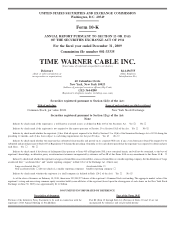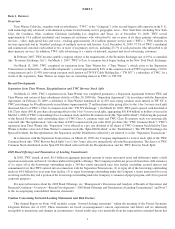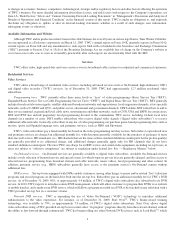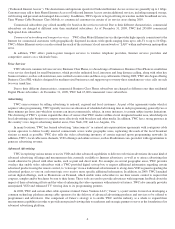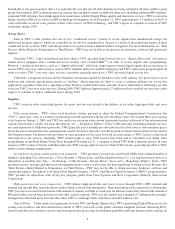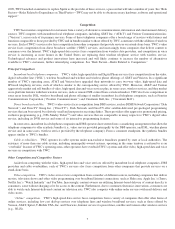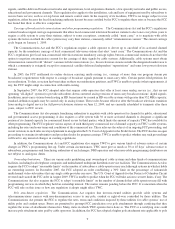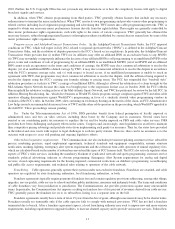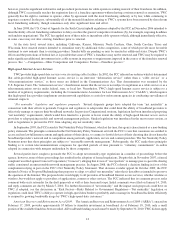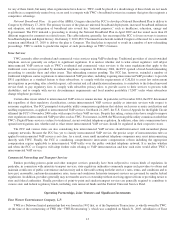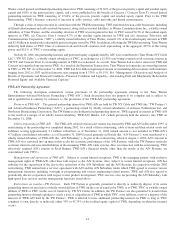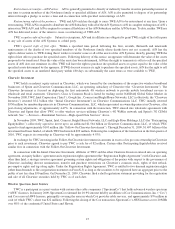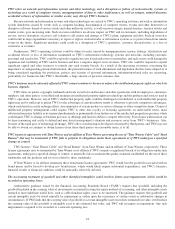Time Warner Cable 2009 Annual Report Download - page 20
Download and view the complete annual report
Please find page 20 of the 2009 Time Warner Cable annual report below. You can navigate through the pages in the report by either clicking on the pages listed below, or by using the keyword search tool below to find specific information within the annual report.Digital Phone competition. TWC’s Digital Phone service competes with wireline, wireless and “over-the-top” phone providers.
An increasing number of homes in the U.S. are replacing their traditional wireline telephone service with wireless phone service, a trend
commonly referred to as “wireless substitution.” Wireless phone providers are encouraging this trend with aggressive marketing and the
launch of wireless products targeted for home use. TWC also competes with “over-the-top” providers, such as Vonage, Skype, magicJack
and Google Voice, and companies that sell phone cards at a cost per minute for both national and international service. The increase in
wireless substitution and in the number of different technologies capable of carrying voice services has intensified the competitive
environment in which TWC operates its Digital Phone service.
Additional competition. In addition to multi-channel video providers, cable systems compete with all other sources of news,
information and entertainment, including over-the-air television broadcast reception, live events, movie theaters and the Internet. In
general, TWC also faces competition from other media for advertising dollars. To the extent that TWC’s services converge with theirs,
TWC competes with the manufacturers of consumer electronics products. For instance, TWC’s DVR service competes with similar
devices manufactured by consumer electronics companies.
Commercial competition. TWC competes with incumbent local telephone companies, especially AT&T and Verizon, across all of
its commercial services: video, high-speed data, voice, networking and transport. In addition, on a stand-alone basis, TWC’s commercial
video service faces competition from DBS providers that compete with TWC primarily in the hospitality and restaurant industry, and its
commercial high-speed data, voice, networking and transport services face competition from national and smaller regional competitive
local exchange carriers or, “CLECs,” and from a variety of smaller incumbent local telephone companies, such as Frontier
Communications and Cincinnati Bell.
Franchise process. Under the Cable Television Consumer Protection and Competition Act of 1992, franchising authorities are
prohibited from unreasonably refusing to award additional franchises. In December 2006, the FCC adopted an order intended to make it
easier for competitors to obtain franchises, by defining when the actions of county- and municipal-level franchising authorities will be
deemed to be unreasonable as part of the franchising process. Furthermore, legislation supported by regional telephone companies has
been enacted in a number of states to allow these companies to enter the video distribution business under state-wide franchises and
without obtaining local franchise approval. Legislation of this kind has been enacted in California, Kansas, Missouri, North Carolina,
Ohio, South Carolina, Texas and Wisconsin, which include some of the Company’s largest operating areas. See “—Regulatory Matters—
Video Services—Franchising” and “Risk Factors—Risks Related to Government Regulation.”
Employees
As of December 31, 2009, TWC had approximately 47,000 employees, including approximately 1,400 part-time employees. 4.6%
of TWC’s employees are represented by labor unions. TWC considers its relations with its employees to be good.
Regulatory Matters
TWC’s business is subject, in part, to regulation by the FCC and by most local and state governments where TWC has cable systems.
In addition, TWC’s business is operated subject to compliance with the terms of the Memorandum Opinion and Order issued by the FCC
in July 2006 in connection with the regulatory clearance of the transactions related to TWC’s 2006 acquisition of cable systems from
Adelphia Communications Corporation and Comcast Corporation (the “Adelphia/Comcast Transactions Order”). Various legislative and
regulatory proposals under consideration from time to time by the United States Congress (“Congress”) and various federal agencies
have in the past materially affected TWC and may do so in the future.
The Communications Act of 1934, as amended (the “Communications Act”), and the regulations and policies of the FCC affect
significant aspects of TWC’s cable system operations, including video subscriber rates; carriage of broadcast television signals and cable
programming, as well as the way TWC sells its program packages to subscribers; the use of cable systems by franchising authorities and
other third parties; cable system ownership; offering of voice, high-speed data and transport services; and its use of utility poles and
conduits.
The following is a summary of current significant federal, state and local laws and regulations affecting the growth and operation of
TWC’s business as well as a summary of the terms of the Adelphia/Comcast Transactions Order. The summary of the Adelphia/Comcast
Transactions Order herein does not purport to be complete and is subject to, and is qualified in its entirety by reference to, the provisions
of the Adelphia/Comcast Transactions Order.
Video Services
Subscriber rates. The Communications Act and the FCC’s rules regulate rates for basic cable service and equipment in
communities that are not subject to “effective competition,” as defined by federal law. Where there has been no finding by the
FCC of effective competition, federal law authorizes franchising authorities to regulate the monthly rates charged by the operator for the
minimum level of video programming service, referred to as basic service tier or BST, which generally includes broadcast television
8



